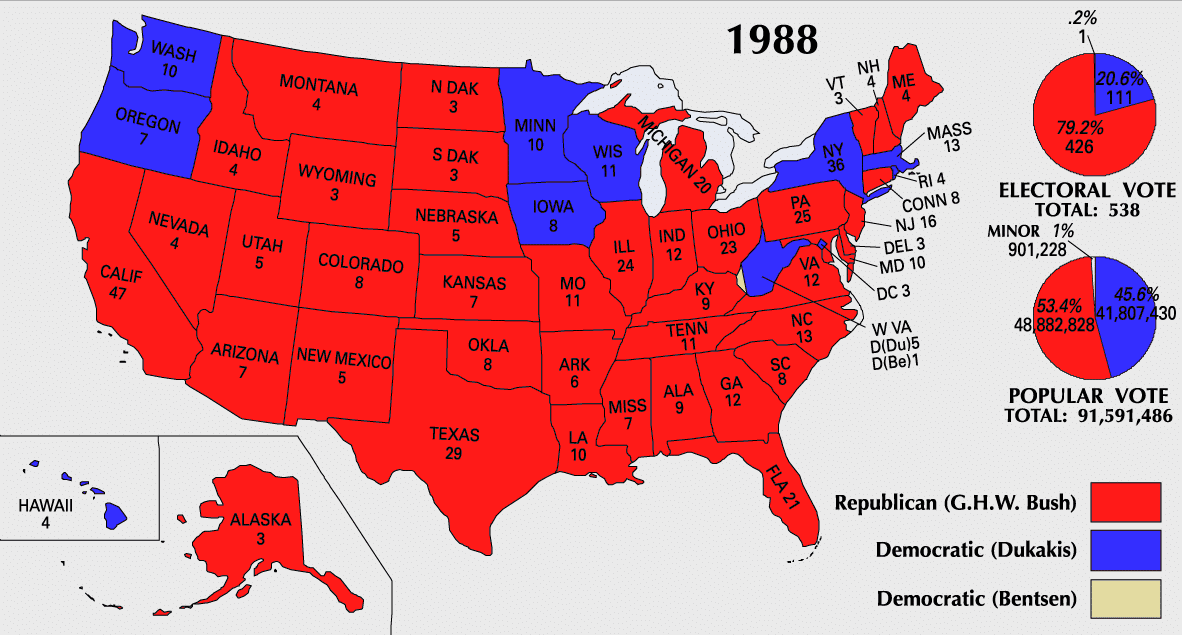The Presidential Election of 1988 would place two new candidates against each other for President of the United States.
The Republicans had dominated the previous two elections and remained popular throughout the late eighties. The Soviet Union was in decline and facing political upheaval, however, it looked as if trouble in the Middle East was beginning.
The Democrats had little luck in the past two elections (1980 and 1984) as Reagan dominated both of his opponents. This time, Reagan could not run, and his Vice President would look to win the White House. The Democrats saw a small glimmer of hope as they did not have to run against the popular Reagan, but the country had not shifted much in the last four years.
The candidates were as follows:
- Republicans: George H. W. Bush and Vice President Dan Quayle
- Democrats: Michael Dukakis and Vice President Lloyd Bentson
Platforms
Republicans: George H. W. Bush promised to continue the policies of Reagan and form a kinder and gentler nation. He also ran under the slogan, "Read my lips, no new taxes!" which resonated with many voters. His goal was to appeal to the base and to also bring in a more moderate Republican and even a center-leaning Democrat. George Bush Sr. faced incredible opposition in the primaries, but the general election would prove to be a different story. Bush's weakness was his involvement in the Iran-Contra controversy.
Democrats: Michael Dukakis was a shift from the 1984 election when the Democrats nominated Walter Mondale. They tried to find a candidate that was more moderate and would appeal to a larger audience. Dukakis was nominated and had a decent record as the Governor of Massachusetts. However, he faced an uphill climb as Bush was able to piggyback off of Reagan's popularity.
Libertarian Party: Ron Paul and Andre Marrou formed the ticket for the Libertarian Party. Their campaign called for the adoption of a global policy on military nonintervention, advocated an end to the federal government's involvement with education and criticized Reagan's "bailout" of the Soviet Union. Paul was a former member of the U.S. House of Representatives, first elected as a Republican from Texas in an April 1976 special election. He protested the War on Drugs in a letter to Drug Czar William Bennett.
While the Libertarian party did not affect the election at all, it injected some new ideas that would be picked up by both parties.
Outcome
The Democrats were able to make up some ground in the election as compared to the election held 4 years prior. However, George H. W. Bush would soundly defeat Dukakis, and the Democrats would have to come up with something different during the next election.
Ron Paul's campaign gained little traction, but the ideas that he advocated began to go mainstream.
The next four years would see the fall of the Soviet Union and the Persian Gulf War. The Democrats would again go back to the drawing board and try to pivot towards the center while placating their base.
Bush carried certain states that have not voted for a Republican since, such as Vermont, all of Maine, Connecticut, New Jersey, Delaware, Maryland, Illinois, and California, while Michigan and Pennsylvania would not vote Republican again until 2016, as did Maine's 2nd congressional district.
Meanwhile, New Mexico wouldn't vote Republican again until 2004, and Arkansas, Kentucky, Louisiana, Missouri, Nevada, New Hampshire, Ohio, and Tennessee wouldn't vote Republican again until 2000.

